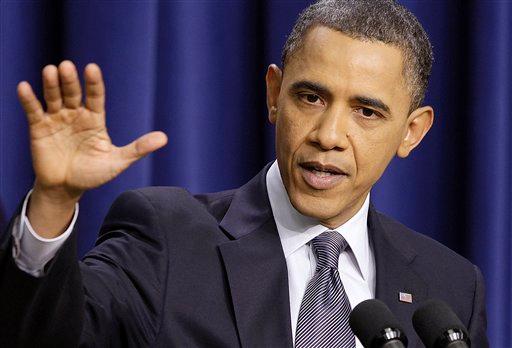WASHINGTON (AP) — Defending his new budget as one of “tough choices,” President Barack Obama said Tuesday that more difficult decisions about the nation’s biggest expenses — Medicare, Medicaid and Social Security — will have to be tackled by Democrats and Republicans acting together, not by White House dictates.
“This is not a matter of, ‘you go first, I go first,'” he said. “It’s a matter of everybody having a serious conversation about where we want to go and then ultimately getting in that boat at the same time so it doesn’t tip over.”
The president pitched his $3.73 trillion budget as a balance of spending on needed programs and significant reductions that would cut the deficit by $1.1 trillion over 10 years. The budget includes a mix of spending freezes on domestic programs, pay hike suspensions for federal civilian workers and new revenues from increased taxes on the wealthy and on oil and gas producers.
But Obama’s deficit relief is far more modest than that detailed by his fiscal commission, which in December proposed measures that would mop up four times as much red ink. Unlike his blue-ribbon group, the administration’s budget does not address structural changes in Social Security or Medicare, the two largest items in the federal budget.
“Look at the history of how these deals get done,” Obama said Tuesday. “Typically it’s not because there’s an Obama plan out there. It’s because Democrats and Republicans are committed to tackling this in a serious way.”
The commission’s bipartisan report included politically difficult recommendation such as increasing the Social Security retirement age and reducing future increases in benefits. And while Obama has promised to overhaul the corporate tax system, he stops short of commission recommendations that would lower rates but generate additional revenue at the same. Obama has called for “revenue neutral” fixes to corporate taxes, meaning they would neither cost more money nor add money to the treasury.
“I’m not suggesting we don’t have to do more,” the president said.
At times defensive, Obama used his news conference to offer his own tutorial on how Washington works.
He voiced exasperation at what he said was the capital’s impatient culture and its insistence on immediate results. He said he faced the same demands on health care, the military’s don’t-ask, don’t-tell policy on gays, and on the uprising in Egypt.
“There’s a tendency for us to assume that if it didn’t happen today, it’s not going to happen,” he said.
He also pulled the curtain back on the partisan positioning typical of politics, while at the same time pressing Republicans to join him at the negotiating table.
“I expect that all sides will have to do a little posturing on television and speak to their constituencies and rally their troops,” he said. “But ultimately what we need is a reasonable, responsible and initially probably somewhat quiet and toned-down conversation about, ‘all right, where can we compromise and get something done.’
Obama at one point overstated the achievements of his budget, asserting that by the middle of the current decade annual federal spending would match annual revenues. “We will not be adding more to the national debt,” he said.
But his budget shows deficits as well as debt increasing every year through 2021, and the president later had to clarify. The balance in spending and revenue, he said, applied only to the smaller “discretionary” portion of the budget, not to interest on the national debt or to rising health care costs in Medicare and Medicaid.
“That’s going to require entitlement reform and it’s going to require tax reform,” he said.
Obama said he also wants to work with Republicans to find common ground on government spending for the remainder of this fiscal year and to avoid a government shutdown. Stopping the basic functions of government could damage the economic recovery, he said.
“I think it is important to make sure that we don’t try to make a series of symbolic cuts this year that could endanger the recovery,” he said. Obama said cutting too deeply in Washington could prompt thousands of layoffs in state and local governments, which would hurt the economy.
“The key here is for people to be practical and not score political points,” he said. “That’s true for all of us.”
Obama’s budget aims to cut the deficit in part with tax increases, including eliminating tax breaks for oil and gas producers, which have failed to win support before under a Democratic control Congress. The measures face an even tougher challenge now that Republicans control the House of Representatives.
“I continue to believe I’m right,” he said, when asked why he relied on previously defeated proposals. “So we’re going to try again.”
His new budget would cut spending on popular energy assistance programs and community development projects. Obama took note of the harsh impact that cuts can have on individual Americans. But he said the most important thing he can do as president is focus on the long-term stability of the economy to help the largest number of people.
“I definitely feel folks’ pain,” he said, mentioning the gripping stories recounted in the 10 letters a day that he reads from among the thousands received at the White House. “You want to help every single one individually.”
____
Associated Press writer Jim Kuhnhenn contributed to this report.







